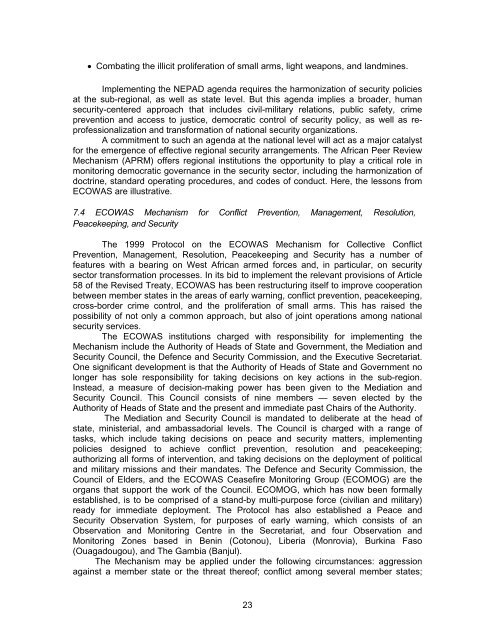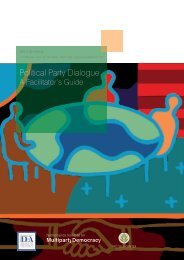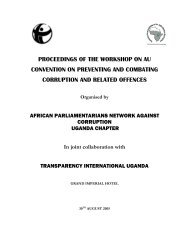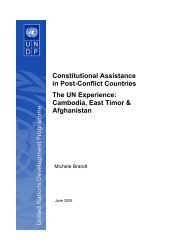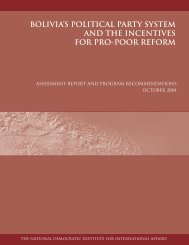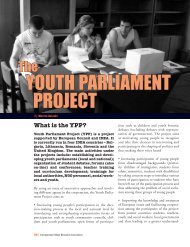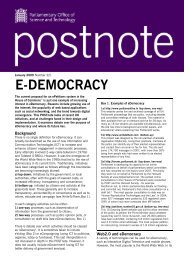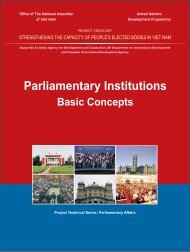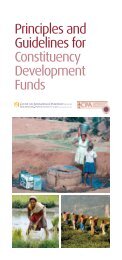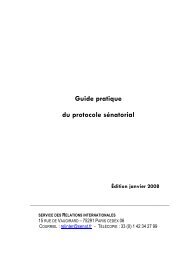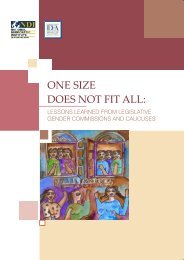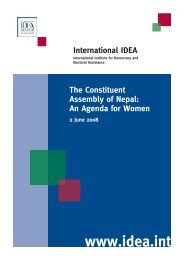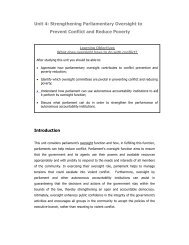Parliamentary Oversight of the Security Sector: Lessons from Ghana
Parliamentary Oversight of the Security Sector: Lessons from Ghana
Parliamentary Oversight of the Security Sector: Lessons from Ghana
Create successful ePaper yourself
Turn your PDF publications into a flip-book with our unique Google optimized e-Paper software.
• Combating <strong>the</strong> illicit proliferation <strong>of</strong> small arms, light weapons, and landmines.Implementing <strong>the</strong> NEPAD agenda requires <strong>the</strong> harmonization <strong>of</strong> security policiesat <strong>the</strong> sub-regional, as well as state level. But this agenda implies a broader, humansecurity-centered approach that includes civil-military relations, public safety, crimeprevention and access to justice, democratic control <strong>of</strong> security policy, as well as repr<strong>of</strong>essionalizationand transformation <strong>of</strong> national security organizations.A commitment to such an agenda at <strong>the</strong> national level will act as a major catalystfor <strong>the</strong> emergence <strong>of</strong> effective regional security arrangements. The African Peer ReviewMechanism (APRM) <strong>of</strong>fers regional institutions <strong>the</strong> opportunity to play a critical role inmonitoring democratic governance in <strong>the</strong> security sector, including <strong>the</strong> harmonization <strong>of</strong>doctrine, standard operating procedures, and codes <strong>of</strong> conduct. Here, <strong>the</strong> lessons <strong>from</strong>ECOWAS are illustrative.7.4 ECOWAS Mechanism for Conflict Prevention, Management, Resolution,Peacekeeping, and <strong>Security</strong>The 1999 Protocol on <strong>the</strong> ECOWAS Mechanism for Collective ConflictPrevention, Management, Resolution, Peacekeeping and <strong>Security</strong> has a number <strong>of</strong>features with a bearing on West African armed forces and, in particular, on securitysector transformation processes. In its bid to implement <strong>the</strong> relevant provisions <strong>of</strong> Article58 <strong>of</strong> <strong>the</strong> Revised Treaty, ECOWAS has been restructuring itself to improve cooperationbetween member states in <strong>the</strong> areas <strong>of</strong> early warning, conflict prevention, peacekeeping,cross-border crime control, and <strong>the</strong> proliferation <strong>of</strong> small arms. This has raised <strong>the</strong>possibility <strong>of</strong> not only a common approach, but also <strong>of</strong> joint operations among nationalsecurity services.The ECOWAS institutions charged with responsibility for implementing <strong>the</strong>Mechanism include <strong>the</strong> Authority <strong>of</strong> Heads <strong>of</strong> State and Government, <strong>the</strong> Mediation and<strong>Security</strong> Council, <strong>the</strong> Defence and <strong>Security</strong> Commission, and <strong>the</strong> Executive Secretariat.One significant development is that <strong>the</strong> Authority <strong>of</strong> Heads <strong>of</strong> State and Government nolonger has sole responsibility for taking decisions on key actions in <strong>the</strong> sub-region.Instead, a measure <strong>of</strong> decision-making power has been given to <strong>the</strong> Mediation and<strong>Security</strong> Council. This Council consists <strong>of</strong> nine members — seven elected by <strong>the</strong>Authority <strong>of</strong> Heads <strong>of</strong> State and <strong>the</strong> present and immediate past Chairs <strong>of</strong> <strong>the</strong> Authority.The Mediation and <strong>Security</strong> Council is mandated to deliberate at <strong>the</strong> head <strong>of</strong>state, ministerial, and ambassadorial levels. The Council is charged with a range <strong>of</strong>tasks, which include taking decisions on peace and security matters, implementingpolicies designed to achieve conflict prevention, resolution and peacekeeping;authorizing all forms <strong>of</strong> intervention, and taking decisions on <strong>the</strong> deployment <strong>of</strong> politicaland military missions and <strong>the</strong>ir mandates. The Defence and <strong>Security</strong> Commission, <strong>the</strong>Council <strong>of</strong> Elders, and <strong>the</strong> ECOWAS Ceasefire Monitoring Group (ECOMOG) are <strong>the</strong>organs that support <strong>the</strong> work <strong>of</strong> <strong>the</strong> Council. ECOMOG, which has now been formallyestablished, is to be comprised <strong>of</strong> a stand-by multi-purpose force (civilian and military)ready for immediate deployment. The Protocol has also established a Peace and<strong>Security</strong> Observation System, for purposes <strong>of</strong> early warning, which consists <strong>of</strong> anObservation and Monitoring Centre in <strong>the</strong> Secretariat, and four Observation andMonitoring Zones based in Benin (Cotonou), Liberia (Monrovia), Burkina Faso(Ouagadougou), and The Gambia (Banjul).The Mechanism may be applied under <strong>the</strong> following circumstances: aggressionagainst a member state or <strong>the</strong> threat <strong>the</strong>re<strong>of</strong>; conflict among several member states;23


